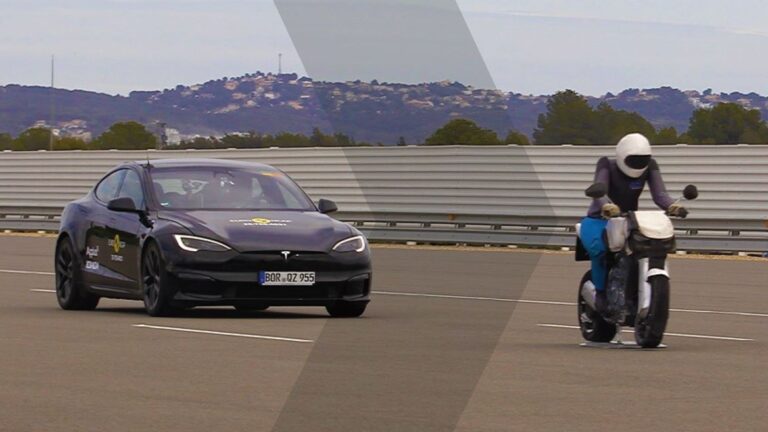Testing by Euro NCAP has shown that while assisted driving technology is increasingly found in new cars, some systems are more user-centric and safe than others.
The Kia EV3, Porsche Macan, Renault 5 and Toyota bZ4X all scored highly in the Euro NCAP assisted driving grading assessment, designed to evaluate how safely partially automated systems are implemented by vehicle manufacturers. All four vehicles were awarded a ‘very good’ rating for assisted driving as Euro NCAP found they offered “exceptional balance between driver engagement and safety backup”.
However, the Tesla Model S and Volvo EX30 performed lower in key areas, leading to both models, together with the MG ZS, being awarded a ‘moderate’ rating for assisted driving. Sitting between these two groups of cars were the Mazda CX-80 and Xpeng G9, which both achieved a ‘good’ rating for assisted driving.
Assessing assisted driving systems
To independently assess the effectiveness of these systems, Euro NCAP’s experts assess a vehicle’s safety technology under a range of criteria, which fall into two scored categories: assistance competence and safety backup. The weighted total gives the car its assisted driving grading, to help consumers compare the user-centric and effectiveness of these systems.
Assistance competence reviews the clarity of consumer information, including capability limitations, status alerts, driver monitoring (keeping hands on the steering wheel) and how the system allows for driver collaboration, for example, the override of the system during a driver-initiated maneuver. The other key components are speed limit detection and adaptive cruise control performance.
The safety backup assesses how well a car’s system avoids a collision when faced with other cars, motorcyclists, cyclists and pedestrians, what action is taken when a sensor or camera becomes blocked, and how the vehicle slows down to a safe stop when the driver becomes unresponsive.
What makes a good assisted driving system?
Euro NCAP’s testers praised the Porsche Macan’s InnoDrive with Active Lane-Keeping system, awarding it 85% for assistance competence and 92% for safety backup. Euro NCAP complemented its promotional material and handbook, which clearly set out the limitations of the system’s capabilities and the driver’s responsibilities, as well as displaying the system status in the driver’s direct line of sight by a head-up display.
Euro NCAP praised the Porsche’s system, which detects when a driver’s hands are off the wheel while driving, issues warnings and ends the assisted driving if the driver fails to respond. When the vehicle manages the steering, it smoothly balances it with any commands from the driver.
The Kia EV3 and Toyota bZ4X, both electric family SUVs, proved similarly competent and intuitive, according to Euro NCAP. Demonstrating how assisted driving systems can perform just as well on more affordable cars, the Active Driver Assist package fitted to the Renault 5 impressed the testers.
This is in clear contrast to Tesla’s latest Autopilot system fitted to the Model S, which performed well for safety backup but fared poorly for assistance competence.
Results of the Tesla and Volvo systems
The name Autopilot of Tesla’s system, as well as its promotional material, were criticized by Euro NCAP as they suggest full automation, which is deemed “inappropriate” by Euro NCAP and led to a downgrade in Tesla’s score. Additionally, its steering input was deemed resistant to a driver attempting to override it, and when the driver does, the system automatically disengages, limiting its usefulness. The Tesla Autopilot scored 94% for safety backup, and 30% in assistance competence.
Euro NCAP’s testers encountered some similar issues with the Volvo EX30’s Pilot Assist system. Like the Tesla, it uses a centrally mounted touchscreen, so the driver must take their eyes off the road to view alerts from Pilot Assist.
“The safe operation of assisted driving systems can only be achieved if consumers clearly understand their role as drivers, know how to operate the system and are aware of its limitations,” said Adriano Palao, AD/ADAS technical manager, Euro NCAP.
“Euro NCAP’s tests on these nine cars have revealed the differences in how effectively the systems support these key elements. Providing correct information for consumers is fundamental. For example, Euro NCAP believes that Tesla is misleading consumers about their Autopilot system’s capabilities simply through its name and marketing, which could have potential safety implications. A well-designed system will co-operate with the driver, appropriately inform about the level of assistance, and ultimately offer crash avoidance in critical situations; otherwise, it may introduce additional risks.”
In related news, Motive, the AI-powered integrated operations platform, has announced the global launch of Positive Driving, an AI model that automatically identifies positive driver behaviors. Read the full story


